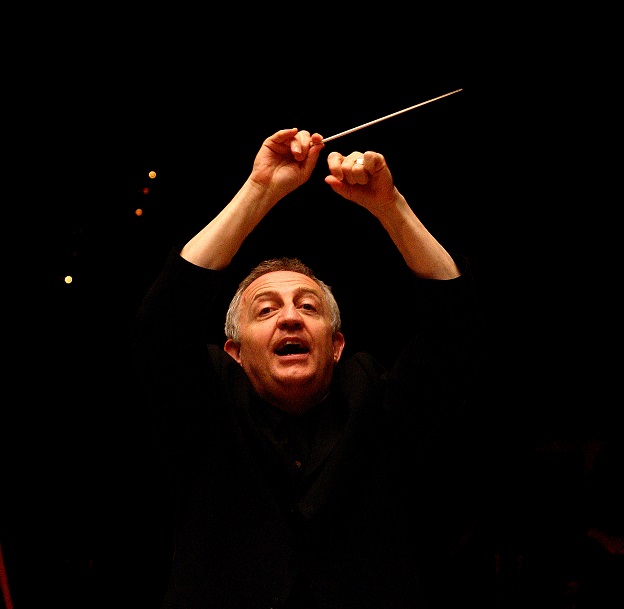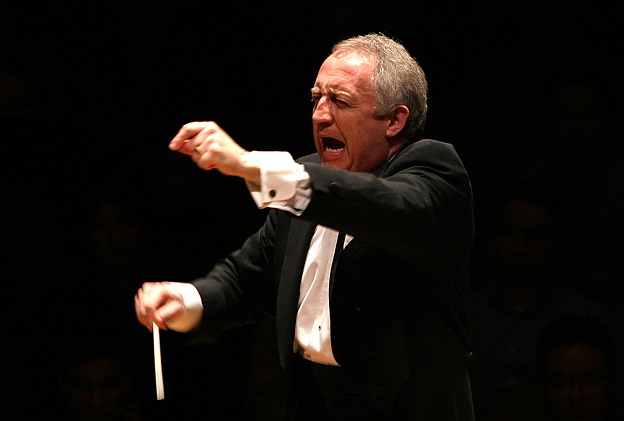Bramwell, what does it mean to conduct an orchestra? I ask this question because the other day, a conductor of great reputation made the remark to me, about a colleague that he had not conducted, but had merely beaten the beat…
Beating the beat is a purely technical gesture that has no other function than to allow the musicians to play together physically. But it is the expressiveness of the gestures, the nuances of the gestures, thus the way of gesticulating that create the true communication and prepare the ground to release the inner spirit of the music. Beating the beat can be very useful in certain musical genres, especially in very complex contemporary works that require great rhythmic precision, but true interpretation requires more: expressive gestures and sometimes also mimicry, the expression of the eyes.
To what extent is the art of conducting a form of authority?
Leading is what we call ‘leadership’, and leadership cannot be conceived without authority. To lead is to give strength to the musicians, to help them to give all that they can give. But it is clear that the era of Toscanini and Furtwängler is definitely over. It was a time when the musicians were considered only as the mechanical part of the unit that is the orchestra and the conductor. Erich Kleiber was a conductor of that generation. But his son Carlos Kleiber was already very different: he had the ability to give the musicians a great strength, a strength that made them surpass themselves. His authority was an authority of liberation.
How can a technically gifted conductor interpret and communicate his vision of a work? Can one really learn to conduct?
A conductor reaches maturity in his art only after a long period of conducting, say in his forties and sixties. An orchestra has the right to expect every conductor to be technically capable of conducting, but the more philosophical side of the job only comes with experience. However, it is also true that for some this comes miraculously early. The others will have to learn and synthesize by following closely everything that happens around them, from far and near. And then, considering that an orchestra is made up of individual musicians, a conductor must also have psychological affinities and therefore be able to treat the musicians according to their character and according to what they need as support. While some musicians can simply be expected to do something, others need to be cajoled, and still others need real encouragement.
What often strikes me when I compare interpretations is the difference in color.
Recently, in a competition for a conductor associated with the Vancouver Symphony, there were about 20 candidates with very different technical levels. But each of them got different colors in the work they were conducting. Each of them made the orchestra sound different. And that fascinated me! But I also know that sometimes I conduct a work, especially if there is a soloist, in totally different ways. In a concerto, I have to go along with the soloist’s views, adopt their tempo, but also the colors and timbres they produce on their instrument. On the other hand, the differences in color and atmosphere, and also in warmth, can also be great in purely orchestral pieces. And this is one of the strengths of music. This is also the reason why each generation is called upon in a certain sense to renew Mozart, to renew Beethoven, to renew Brahms…
Christian Thielemann once told me that he sometimes asks a soloist, on his way to the stage: « Are we going to do the prepared version or a wilder version…
I have never had such a conversation with a soloist on the way to the stage, but more than once I have conducted a concert where the soloist went wild in the middle of the performance, taking a very different direction from what had been done in rehearsal. Playing a work is like a ballad. If you travel across England from West to East, you will sometimes pass through landscapes that you want to contemplate exhaustively. This is also true for musical interpretation. Sometimes you will discover a passage in a completely new way and you will give a different image of that passage.
Does a conductor follow the soloist or does he lead him?
It depends on the personality and character of both. But, in principle, I tend to follow the soloist. Like Sir Adrian Boult, with whom I studied, I think the soloist has probably spent much more time with a concerto than the conductor, so it is out of humility and politeness that the conductor should play a secondary role.
You just said something that struck me: each generation is called upon to renew Mozart, to renew Beethoven, to renew Brahms. Isn’t it stressful for a conductor to be faced with such a demand, isn’t it irritating to have to say something new every time?
I wanted to say that music necessarily undergoes a natural evolution over the years. It’s more an evolution of attitude, of style than a search for detail. There are conductors who deliberately decide to say something new, even shocking, by trying a number of tricks to make a work supposedly more attractive. When I was young, I must have sometimes strayed into such unfortunate behavior. Today, after conducting the standard repertoire many times, I don’t care about all that anymore. When I conduct Brahms’ first symphony I can approach the work with confidence. But I remember that the first time I conducted it, I was terrified: knowing the style of other conductors and the traditions, I saw myself in front of a huge mountain. But I soon realized, as any experienced mountaineer would, that there are many paths that all lead to the top. The solution to unlocking the truth of a work lies not only in the work itself, but also in yourself, in the artist who interprets it. If I have the strength to be honest and keep my ego out of the music, if I can find Bramwell Tovey’s answer to a work, I am sure that I will find the path that both the orchestra and the audience are waiting for. They are waiting for my response to a composition as a musician. If this response is based solely on the desire to do something new, it will fail in the short term, because it will be too superficial.
Gidon Kremer said in an interview, in his own way, that all the young artists who are currently being catapulted into the market have no future because, according to him, they have nothing to say. I think you would be more nuanced in such a discussion.
Let’s say that the music market offers a lot and some people will not resist the money or the fame of the moment. And it’s certainly correct to say that most young artists don’t have as much to say as they will once experience has matured them. Some interpretations of young musicians remind me of my first encounter with a work that could be very direct, very spontaneous, whereas today I can better measure the value of things and look at them with a different distance.
But I wouldn’t say that young artists should be neglected or underestimated. And it is always refreshing to hear them play, to see them perform in a repertoire of great tradition. Music is certainly a very complex thing, but it is also somewhere a basic means of communication, and in many cases I find it very interesting to hear what young people have to say, even when their views are not yet mature.
In interviews with instrumentalists, there is often talk about national or regional schools and traditions. And many young people tell me that their instrument is globalized and that they don’t feel connected to a Russian school, to a French school…
I don’t agree with such an opinion. The schools are very much alive. The Russian school of piano still exists and it is very different from the English or the American school, or even the Canadian school which also has its particularities. This is also true for other instruments, and even for conductors. This can be seen very clearly in the auditions for new positions in the orchestra: French candidates are much more likely to present themselves as soloists, whereas Germans are better educated for playing in the orchestra. The music education systems in the two countries seem to be very different. The orchestras are very different. Each orchestra is different from the other. American orchestras are different from European ones, and that is ultimately the richness of musical life. The concept of globalization has nothing to do with music except for its marketing.

Bramwell Tovey on the construction site of the Philharmonie in Luxembourg, together with Remy Franck (l) (c) Philippe Hurlin
At the Philharmonie in Luxembourg which opened in 2005 you are confronted with a new environment, a new acoustic. What role do the acoustics play in the performance?
A crucial role! Crucial for the tempo, crucial for the sound quality. A room that is too dry can destroy a performance. In a very large hall like the Royal Albert Hall with its 7000 seats you have to conduct with more volume but also with a slower tempo than elsewhere. In the Philharmonie in Luxembourg we have the chance to work in an acoustic that transmits the truth of the sound in the hall.
What are the criteria that define good acoustics for you?
When a musician plays a note, he creates a sound. He sends the sound on a journey. He can feel if the sound travels through the space and how it is enriched by the acoustics or if, in the worst case, it lands very quickly and dies. If you feel that the room works, you can work on the sound, create colors, nuances, soft or hard sound according to your own view and not because the acoustics dictate it. Ideally, it is the artist, the soloist, the ensemble, the conductor who make the interpretation, not the building. But since not all halls allow you this freedom, you have to obey them by adjusting an interpretation to a sound. This is what happens regularly when we are on tour.


























